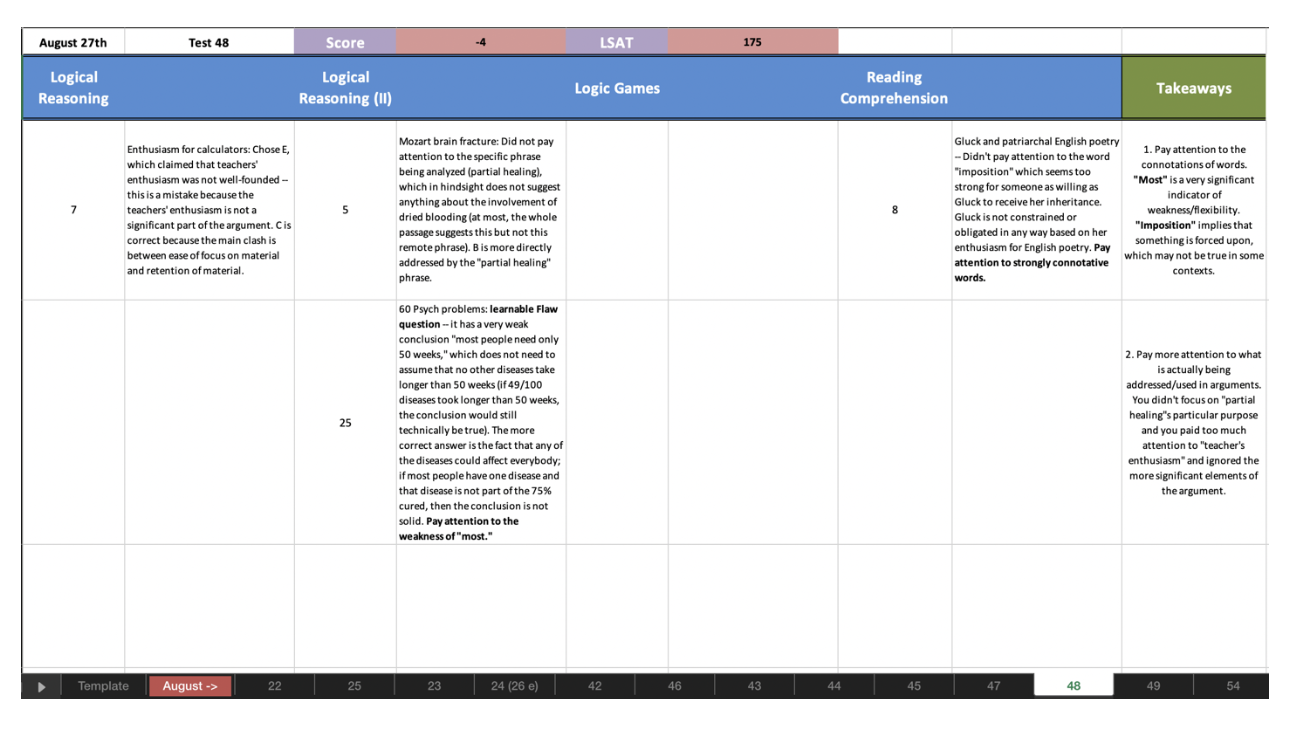Standardized test prep can be a grueling process for the mind, body, and spirit. It took a great degree of willpower not to hurl myself into the sun whenever my practice scores began to dip again (and again, and again). But as frustrating as they might be, disappointing practice days are undoubtedly the best days to improve.
Reviewing your practice exams is just as important as taking the exam itself, if not more so. Most of the applicants I’ve worked with understand this. However, many of them followed a similar pattern of scoring their exams, reading through the explanations for their incorrect answers, and then calling it a day or turning to the next exam. While this approach is certainly helpful, it is a passive and therefore less efficient way to learn from one’s mistakes.
Whenever possible, try to turn your review into an active process that engages your brain and further flexes your test-taking muscles. I learned this early on from a mentor of mine, who taught me a study strategy that I relied on for the SAT, the LSAT, and even the Uniform Bar Exam: the wrong answer log.
Keeping a wrong answer log
For each practice exam that you take, record the questions that you got wrong. If you are feeling particularly zealous, you can record the full question prompt as well as each answer choice for easier accessibility. I think Excel is the easiest medium to do this, but a Word document (or even a pen and paper) works just as well.
By keeping a comprehensive log of all of the questions that you answered incorrectly, you slowly build up a repository of lessons and challenging questions that you can review later on. This is a very helpful way to familiarize yourself with your growth areas. But even if you never refer back to a particular question, the act of recording that question is helpful in and of itself to imprint the lesson into your mind.
Write your own, personalized answer-explanation
For each question that you answered incorrectly, you want to write down the following:
- Why the correct answer is correct
- Why the answer you chose is incorrect & why you chose that answer
- Why the other two answers are incorrect
By writing down why the correct answer is correct, you are actively engaging with the logic or lesson that the exam writer had in mind. This is what one does when one reads through the official question explanations. However, most test-takers neglect the other three answer choices. By also writing down why your answer was incorrect—and why that answer tempted you in the first place—you can shine a light on the personal habits or patterns that led you to make that mistake.
Understanding why an incorrect answer is incorrect is just as important as understanding why the correct answer is correct. Because exam writers are tasked with writing four equally plausible answer choices, each wrong answer contains four valuable lessons that one can learn from in their review. While some wrong answers may be obvious or self-evident to you, it is still a useful practice to articulate your implicit thought processes. For some tests, like the LSAT, there is a sea of online resources where people have written their own answer explanations for every question of every test since the dawn of time. Use them—especially when you feel confused or frustrated with the one in front of you.
Make note of global takeaways or goals for yourself
After your careful review, take the opportunity to jot down some global notes and takeaways for yourself. Which sections do you struggle with and what type of questions should make you more cautious? What is a mistake that you keep making? What is a method that you want to try in your next exam to fix the issue you had today? Doing this helps give you direction for your next practice exam.
This process is time-consuming, but the extra time you put into reviewing your exams is worth it. The sooner you can identify your own habits and gaps of knowledge, the more time you’ll have to address them. Good luck!


Comments